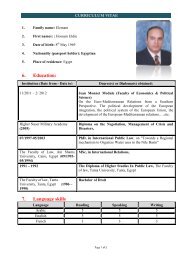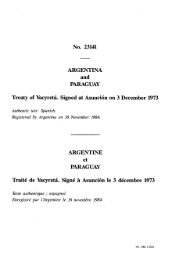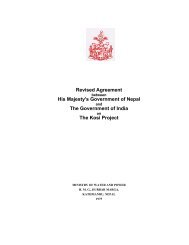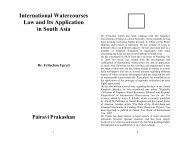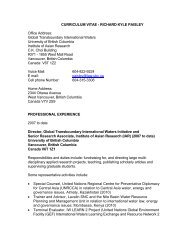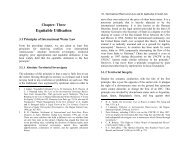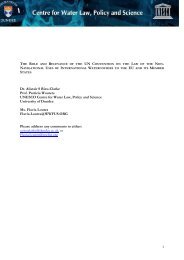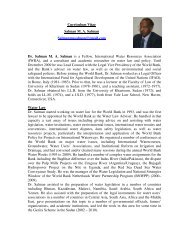Upreti, Trilochan, International Watercourses Law and Its Application ...
Upreti, Trilochan, International Watercourses Law and Its Application ...
Upreti, Trilochan, International Watercourses Law and Its Application ...
You also want an ePaper? Increase the reach of your titles
YUMPU automatically turns print PDFs into web optimized ePapers that Google loves.
Equitable Utilisation / 115 116 / <strong>International</strong> <strong>Watercourses</strong> <strong>Law</strong> <strong>and</strong> <strong>Its</strong> <strong>Application</strong> in South Asiain Article 6 of the UNCIW. 31 In order to give emphasis to thepopulation factor it was essential to put it expressly to avoidany confusion created by the above judgment. In the case of theallocation of resources between two developing countries, theless developed country, for example as between India <strong>and</strong>Nepal, Nepal, should get priority according to the rule ofequity. This is by analogy with the tradition of developedcountries providing finance to the development effort ofdeveloping countries, to less developed countries at differentstages of development.It can be argued that developing <strong>and</strong> vulnerable nations couldbenefit from socio-economic, <strong>and</strong> population factors stipulatedin Article 6 of the UNCIW, whilst sharing <strong>and</strong> allocating thebenefits from common water resources. 32 The next significantdevelopment is the interpretation of equitable utilisation in thecontext of the Gavcikovo-Nagymoros case by the ICJ, whichclearly recognised equitable utilisation as a basic rule ininternational law that gives impetus to Articles 5 <strong>and</strong> 6 of theUNCIW. 33 In this case, the court held the view that accordingto the treaty of 1977, Hungary had agreed to share the benefitsfrom the Danube River. Non-implementation of the treaty,however, did not mean that it had forfeited its right over thereasonable <strong>and</strong> equitable sharing of the benefits from thereon. 3431 Judge Weermantry's opinion in the Maritime Delimitation in the Areabetween Greenl<strong>and</strong> <strong>and</strong> Jan Mayen case (Den.v.Nor.) ICJ Reports(1993), p. 268: “no general proposition can be laid down that thepopulation factor is in all cases irrelevant.”32 X. Fuentes, “Sustainable <strong>and</strong> Equitable Utilisation of <strong>International</strong><strong>Watercourses</strong>” (1998) in 69 BYBIL, p. 119; also see principle 6 of theRio Declaration proclaiming that the special situation <strong>and</strong> needs ofdeveloping <strong>and</strong> those most environmental vulnerable, shall be givenspecial priority.33 In the Gavcikovo-Nagymaros case interpretation of equitable utilisationhas been construed as a skeleton rule of shared natural resourcesbetween the states, in 37 ILM (1998), para. 85, p. 191.34 Ibid. p.190.The equitable utilisation rule reciprocates with the no harm rulein Article 7, the obligation not to cause significant harm <strong>and</strong> totake appropriate measures to prevent significant harm to theother watercourses states:“2 where significant harm is nevertheless caused toother watercourses States, the States whose usecauses such harm shall, in the absence of agreementto such use, take all appropriate measures, havingdue regard for the provisions of articles 5 <strong>and</strong> 6, inconsultation with the affected State, to eliminate ormitigate such harm <strong>and</strong>, where appropriate, todiscuss the question of compensation." 35Article 8 prescribes the general obligation to cooperate.Similarly, Articles 20 <strong>and</strong> 21 oblige states to prevent, reduce<strong>and</strong> control pollution. Non-compliance with those provisionscould be alleged as a breach of Articles 5 <strong>and</strong> 6, implyinginequitable use of water resources. 36In practice, however, there have been very bitter experiences ofnon-co-operation, which have led to a situation of war. 37 TheArab decision to build an all-Arab diversion of the Jordanheadwaters to preclude the Israel National Water Carrier endedthree years later when Israeli tank <strong>and</strong> air strikes halted35 UNCIW: Article 7(2).36 Ibid. Article 20/21.37 Supra note 13 p. 173; also see supra note 17, pp. 639-641: During the1948 war, the Rutenberg Electricity generating plant was destroyed byIsrael to avoid exclusive control of the Jordan <strong>and</strong> Yarmuk waters byArabs. Arab states in 1964, had taken a steps to build dams in order toutilise water from the Wazzani, Hasbani <strong>and</strong> Banyas rivers, forirrigation in Lebanon, Syria <strong>and</strong> Jordan, after conveying water to theJordan valley through the East Ghor canal. Israel considered this is anaggressive action that threatened its water resources <strong>and</strong> destroyed itswork site in an attack.



